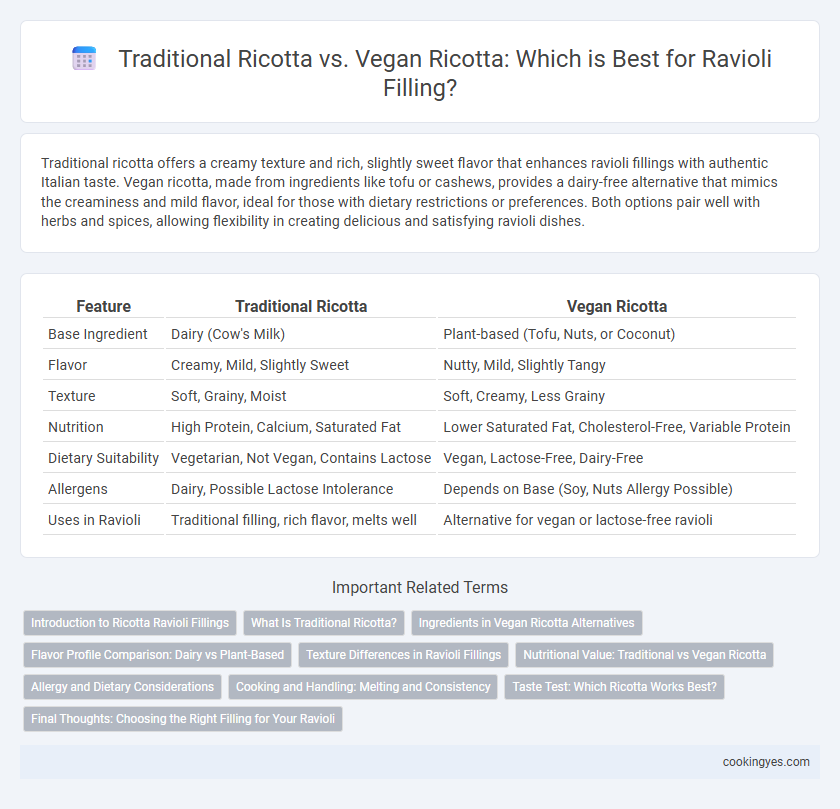Traditional ricotta offers a creamy texture and rich, slightly sweet flavor that enhances ravioli fillings with authentic Italian taste. Vegan ricotta, made from ingredients like tofu or cashews, provides a dairy-free alternative that mimics the creaminess and mild flavor, ideal for those with dietary restrictions or preferences. Both options pair well with herbs and spices, allowing flexibility in creating delicious and satisfying ravioli dishes.
Table of Comparison
| Feature | Traditional Ricotta | Vegan Ricotta |
|---|---|---|
| Base Ingredient | Dairy (Cow's Milk) | Plant-based (Tofu, Nuts, or Coconut) |
| Flavor | Creamy, Mild, Slightly Sweet | Nutty, Mild, Slightly Tangy |
| Texture | Soft, Grainy, Moist | Soft, Creamy, Less Grainy |
| Nutrition | High Protein, Calcium, Saturated Fat | Lower Saturated Fat, Cholesterol-Free, Variable Protein |
| Dietary Suitability | Vegetarian, Not Vegan, Contains Lactose | Vegan, Lactose-Free, Dairy-Free |
| Allergens | Dairy, Possible Lactose Intolerance | Depends on Base (Soy, Nuts Allergy Possible) |
| Uses in Ravioli | Traditional filling, rich flavor, melts well | Alternative for vegan or lactose-free ravioli |
Introduction to Ricotta Ravioli Fillings
Traditional ricotta for ravioli filling offers a creamy texture rich in whey protein and calcium, making it a classic choice in Italian cuisine. Vegan ricotta, often made from tofu, nuts, or cashews, provides a dairy-free alternative while maintaining a smooth consistency suitable for stuffing. Both options create distinct flavor profiles, catering to different dietary preferences without compromising the delicate balance of ravioli fillings.
What Is Traditional Ricotta?
Traditional ricotta is a fresh Italian cheese made from the whey leftover after the production of other cheeses, primarily from cow, sheep, or goat milk. It has a creamy texture with a mildly sweet and slightly tangy flavor, making it ideal for ravioli fillings that require a rich, authentic taste. The high protein and moisture content in traditional ricotta contribute to a smooth, tender filling that pairs perfectly with savory or herb-infused ravioli recipes.
Ingredients in Vegan Ricotta Alternatives
Traditional ricotta for ravioli filling typically consists of whey, milk, and sometimes egg, providing a creamy texture and mild flavor. Vegan ricotta alternatives often use ingredients such as tofu, cashews, almonds, or coconut milk combined with nutritional yeast, lemon juice, and garlic to mimic the tanginess and richness of dairy ricotta. These plant-based components offer a similar consistency and savory profile, making them ideal for vegan ravioli recipes without compromising taste.
Flavor Profile Comparison: Dairy vs Plant-Based
Traditional ricotta offers a rich, creamy texture with a slightly sweet and nutty flavor derived from dairy, enhancing ravioli fillings with authentic, smooth mouthfeel and subtle tanginess. Vegan ricotta, made from plant-based ingredients like cashews, almonds, or tofu, provides a milder, earthier flavor profile that adds a gentle nuttiness and can be customized with herbs or nutritional yeast for depth. The contrast between dairy and plant-based ricotta fillings influences the overall taste experience, with traditional ricotta delivering classic richness while vegan options offer lighter, versatile alternatives suited to various dietary preferences.
Texture Differences in Ravioli Fillings
Traditional ricotta offers a creamy, slightly grainy texture that enhances ravioli fillings with a smooth yet substantial mouthfeel. Vegan ricotta, often made from tofu or nuts, tends to have a firmer, sometimes crumbly texture that can vary depending on the ingredients and preparation methods used. Texture differences impact the overall bite and mouthfeel of ravioli, influencing how well the filling complements the pasta casing.
Nutritional Value: Traditional vs Vegan Ricotta
Traditional ricotta is rich in protein, calcium, and vitamin A, providing a creamy texture and essential nutrients from dairy. Vegan ricotta, often made from cashews, almonds, or tofu, offers a lower cholesterol option with plant-based protein and fiber, appealing to those with lactose intolerance or dietary restrictions. While traditional ricotta contains higher saturated fat, vegan versions typically have healthier fats and added nutrients depending on the plant base used.
Allergy and Dietary Considerations
Traditional ricotta for ravioli filling contains dairy, making it unsuitable for those with lactose intolerance or milk allergies, while vegan ricotta offers a dairy-free alternative, often made from nuts or tofu, catering to lactose-intolerant and vegan diets. Vegan ricotta eliminates common allergens like casein and whey, reducing the risk of allergic reactions and accommodating gluten-free and soy-free variations. Choosing between traditional and vegan ricotta depends on dietary restrictions, allergy concerns, and personal preferences for texture and flavor in ravioli.
Cooking and Handling: Melting and Consistency
Traditional ricotta for ravioli filling offers a creamy texture that softens well when exposed to heat, maintaining a delicate consistency without becoming overly runny. Vegan ricotta, often made from cashews or tofu, tends to have a firmer structure and may require additional moisture or oil to achieve a smooth melt, ensuring it holds shape during cooking. Proper handling of both types involves gently folding the filling to avoid graininess and adjusting moisture levels to balance meltability and firmness in the final ravioli dish.
Taste Test: Which Ricotta Works Best?
Traditional ricotta offers a creamy, slightly sweet flavor with a smooth texture that enhances the rich filling of classic ravioli. Vegan ricotta, often made from tofu or cashews, provides a mild, nutty taste that complements plant-based ravioli recipes while maintaining a similar creamy consistency. Taste tests reveal that while traditional ricotta excels in authenticity and richness, vegan ricotta appeals to those seeking a dairy-free alternative without sacrificing the delicate mouthfeel essential for ravioli.
Final Thoughts: Choosing the Right Filling for Your Ravioli
Traditional ricotta offers a creamy, rich texture with a distinct dairy flavor that complements classic ravioli recipes, providing authentic Italian taste. Vegan ricotta, made from ingredients like tofu, cashews, or almonds, delivers a dairy-free alternative that retains a similar creamy consistency while catering to plant-based diets and lactose intolerance. Selecting the right filling depends on dietary preferences, flavor profiles, and nutritional goals, ensuring a satisfying ravioli experience for all.
Traditional ricotta vs Vegan ricotta for ravioli filling Infographic

 cookingyes.com
cookingyes.com